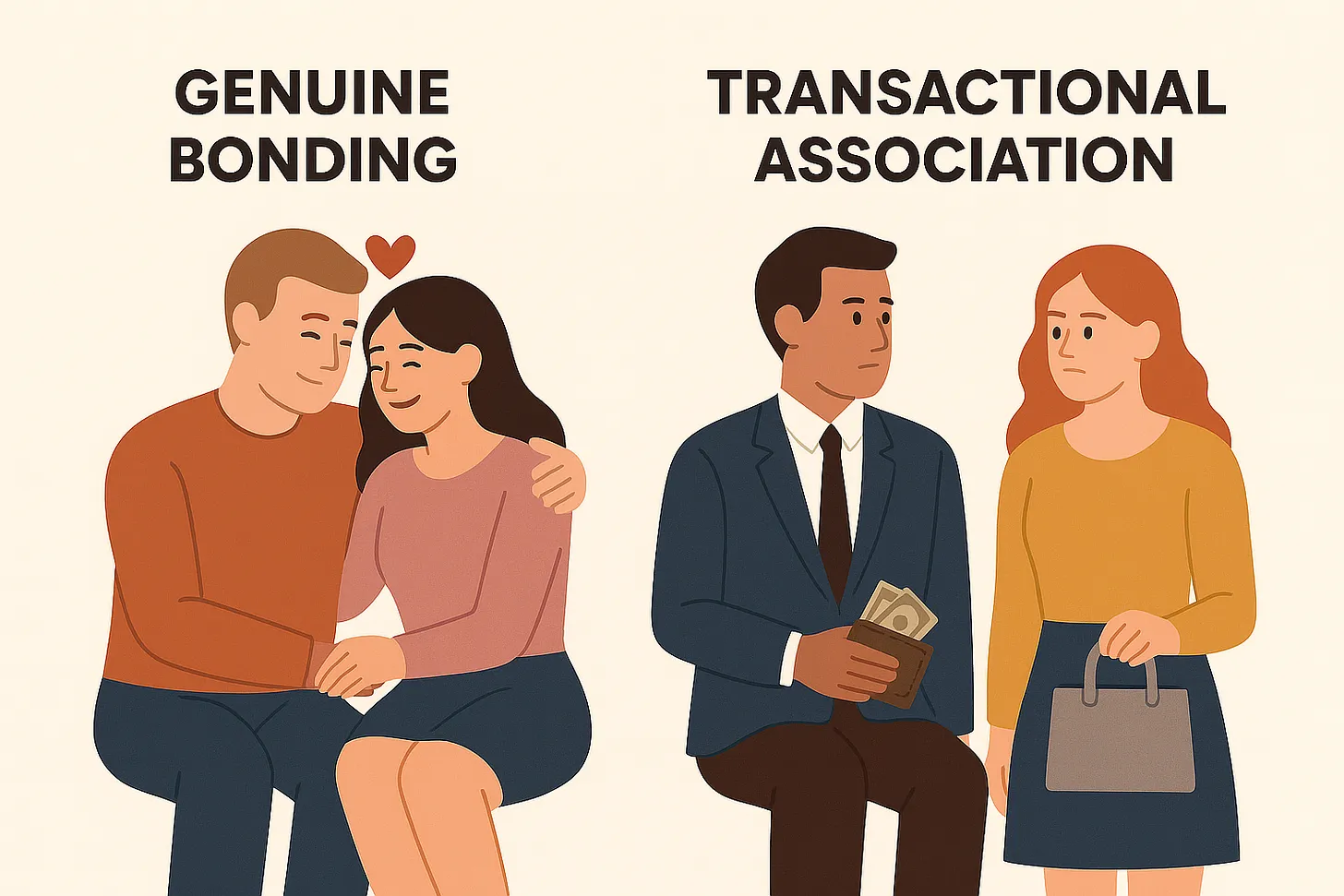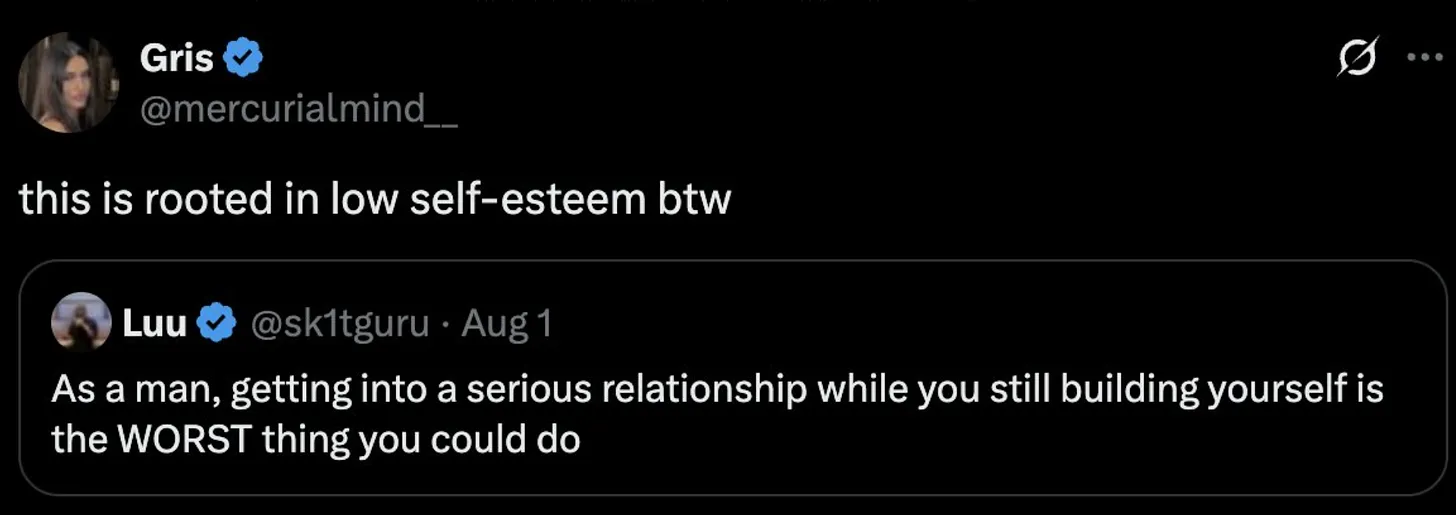
French OG
August 11, 2025


There is this idea of building, and they will come. They indeed will, but ask yourself for what reason.
There is this saying, women wait at the finish line and fuck the winner.
My version is more along the lines that women wait at the finish and fleece the "winner".
Whenever people form connections with others, whether it is friendship or even relationships, they will tend to notice that the strongest bonds are those formed in childhood or young adulthood. Look at who your friend groups are. They are generally from school or college, unless you start early in your career. People will obviously live their own lives and be less present, and it is the circle of deeper trust, but unless a powerful compatibility happens later in life, it is less likely. This also explains why parents who have the means will want to put their children in the best schools to develop friendships that could potentially help later on, outside of the right influence for their kids. The adult version is to attend top MBA schools more for the network they will build rather than the value of the teachings.
Strong bonds happen when we are less shaped, and we are adapting or evolving through life's curveballs. The friendships or relationships that occur later tend to be more stale and not as long-lasting, because they have been less tested, and the required momentum and shared experience are harder to achieve as people's calendars of responsibilities narrow that opportunity window.
People are already settled into their lives and routines. They already have their long-term friends group, a pet, and a demanding job that requires the bandwidth to entertain new interactions with others, which is harder because there is competition for time.
Another explanation is the fact that people are less malleable or willing to compromise as they have built themselves up from experience, and their tolerance level for faux pas becomes much lower. Some will argue that it is better for a filtering mechanism; however, what is the likelihood that you will find the picture-perfect plug-and-play person as you get older?
People are less willing to give the benefit of the doubt because:
1) They already have had genuine experiences in the past, and there is no room for handicaps at the beginning. This is why you see a lot of 30 and 40+ year-olds refocusing on their friends and family instead of looking for a partner in dating, or treating it as a side quest.
2) They won't allow the other person to build with them emotionally because they are now mostly closed off, having achieved despite others rather than thanks to them. People are less likely to allow someone into their private garden because they were not there when it was being built. To give the most extreme example, who feels like a winner, having to pick up a woman with kids in tow.
In the end, past the building phase, if you want something genuine as a man, you have to accept that the closest thing, and even that, I have a lot of reserves, are going to be women your own age... not the most appealing of prospects considering their baggage. Or opportunistic young women who see you as some bag to get when they don't have daddy issues. That is fine, if you are just looking to score, but thinking you are going to get the best when you are looking for something genuine to establish a relationship is close to delusional.
Past a certain age, I understand why Luu says that, as it becomes a reality that a man will be appreciated and seen for his wallet and what it can offer him, so putting himself in that position makes total sense; however, it must come from a position of entertaining overtly transactional relationships, which is totally fine in and of itself.
However, I understand where Gris is coming from, saying that it is rooted in low self-esteem, where a man does not feel he qualifies unless he maxes out on all his skills in the RPG of Life. What happens when that person loses it all, or derives his sense of value from materialistic metrics?
Money is an amplifier, but part of your journey as a man is suffering emotional failures and rising above them, not avoiding them, as it will only postpone life realisations later on, and with much higher costs because it has a double whammy:
1) The opportunity cost of not enjoying a genuine bond with the opposite sex, who believed in you and supported you along the way in your success, translates to a lower frequency of emotionally resonating with a future spouse when in a relationship
2) The financial cost because of the lack of relationship experience to know how to navigate others in challenges.
Where Luu is right is that in your 20s, this is when you have the highest vitality and using that for business endeavours is your best bet. It just does not have to be either or. Because the best relationships or even friendships you will ever experience are the ones when you were there for one another in times of distress, and you could rely on that other person, this creates a hard-to-break bond, which goes beyond the logical and transactional mindset, which is cold.
As the saying goes, you only know who your true friends are when times are tough. This is the same for relationships.
This is why soldiers who survived the war have this incompressible link once back in the motherland. At the same time, people who started as cold in the deal-making will invite people who are as cold, if not colder, in the contract-breaking or not renewing.
Suppose you want to increase the chances of a lifelong commitment. In that case, building with someone who is there with you and supportive in the process, and rewarding them when the tide turns to your advantage, is one of the most mutually gratifying experiences you can have.
Granted, these individuals are becoming a scarce commodity in a take-everything-you-can mentality with a short-term bias in a modern environment. So if you are more in the defensive mindset, Luu's viewpoint is preferable, but at the expense of missing out on the upside. Gris's viewpoint also stands in an offence-driven mindset, where anything less than genuine human interaction coming from a place of wholeness rather than one of coldness is not worth it, even at the expense of a potential massive disappointment.